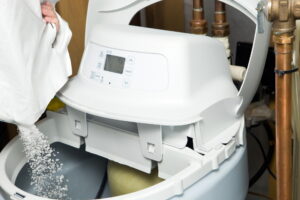If the source of water that comes into your home has high mineral content, it can do a lot of damage to your home’s plumbing system. The good news is, there’s something you can do without it. Give our team a call to schedule an in-home assessment for a water softener in Maple Grove, MN.
You can keep reading to learn more about what a water softener is, how it works, and why it might be beneficial for your home. It’s an easy addition to make to your home that can benefit you for years to come and even increase your home’s value.
When Is a Water Softener Needed?
Your home needs a whole-house water softener if you have hard water. There are different levels of hard water classification. Each one means that there is more mineral content in your water. 60 or less mg/L means that your home has soft water. From there, up to 120 mg/L is considered moderately hard, up to 180 mg/L is hard water, and anything higher than that is considered very hard.
Water that is more than moderately hard means that you should consider a water softener. However, it’s really a personal decision for your home and family. Many homeowners invest in water softeners when their water has lower mineral content. The idea is that a water softener eliminates these minerals so they don’t have a chance to negatively impact your plumbing system and water appliances by causing corrosion.
How Does a Water Softener Work?
A water softener gets installed in your home so that all water has to pass through before entering your plumbing lines or being used at sinks, showers, or appliances. It filters water through a process of ion exchange. Water enters the water softener and the minerals get switched for sodium ions.
Once water is filtered and softened, the hard minerals get flushed into a brine tank to drain out so that they can be cleaned out. The water that transfers into your home has a lower mineral content than before. To keep your water softener working, you’ll have to check the salt levels regularly and refill it when needed. You’ll also have to take steps to clean out the brine tank, which is where minerals collect.
Benefits of a Whole-House Water Softener
The minerals in hard water don’t necessarily pose any risks to your health. However, they are very abrasive and can damage your pipes, plumbing fixtures, and appliances like your water heater, dishwasher, and clothes washer. This corrosion can lead to rust development. Once rust begins, it cannot be reversed inside components or entire appliances need to be replaced.
The minerals in hard water also cause limescale buildup, which can clog water lines and lead to low water pressure. You may have to replace plumbing fixtures in your home sooner than you would otherwise and appliances like your dishwasher. Your clothes washer may not last as long with hard water. A water softener can eliminate all of these concerns and help appliances to enjoy a longer-than-average lifespan.
Contact Comfort Matters Heating, Cooling, & Plumbing today to schedule an appointment with our professionals. With you through THE HIGHS & LOWS!


